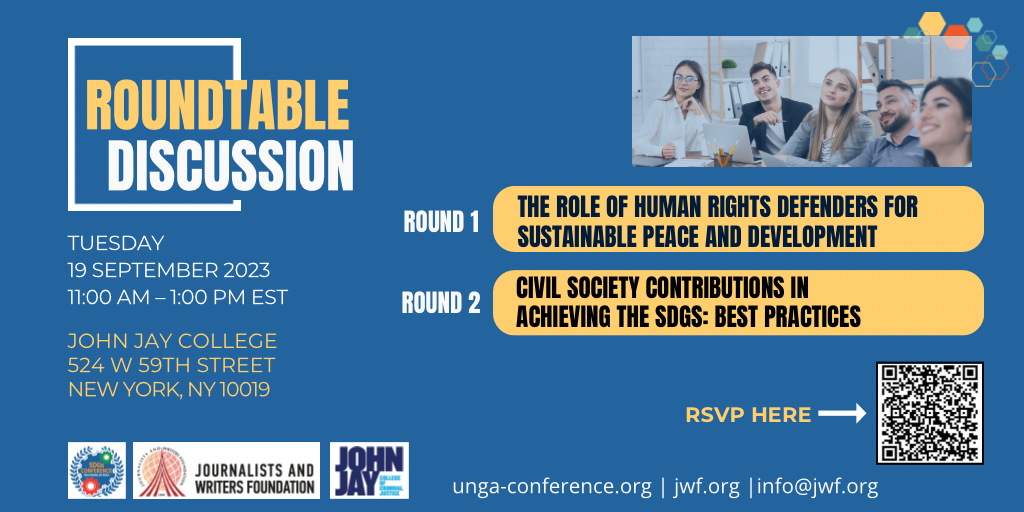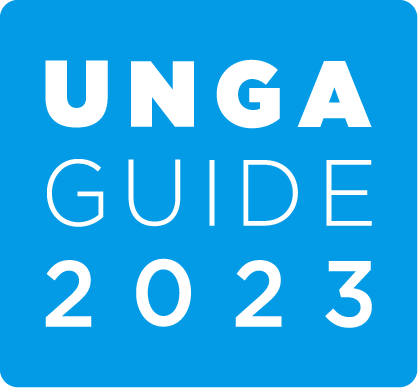
ROUNDTABLE DISCUSSION: The Role of Human Rights Defenders for Sustainable Peace and Development

ROUNDTABLE DISCUSSION
19 September 2023, Tuesday
11:00am – 1:00pm EST
John Jay College of Criminal Justice
524 W 59th St, New York, NY 10019
Link for In-Person/Online Registration
https://docs.google.com/forms/d/e/1FAIpQLSc2zPtAQTtnl7jCrAMhUwQ1zFJ_J_F16asXDbjvUiwlbrQ8NQ/viewform
As a part of the SDGs Conference 2023, the Journalists and Writers Foundation and its Global Partners is organizing the Roundtable Discussion to discuss critical issues to promote and protect sustainable peace and development. This side-event aims to create a platform for the international delegations of civil society members, journalists, academics, experts, and human rights advocates participating at the SDGs Conference 2023 to share their expert opinions, exchange ideas on various development challenges and offer inclusive solutions to the contemporary challenges on social, economic, and environmental issues.
ROUND 1: The Role of Human Rights Defenders for Sustainable Peace and Development
September 2023 will mark a critical turning point in the implementation timeline of the Sustainable Development Goals (SDGs). With this current rate of progress and arising geopolitical peace and security complexities, Global Goals are a promise in peril. According to the recently released Sustainable Development Goals 2023 Report, only 15% of the Goals are on track while 48% are severely behind the target lines and 37% even regressed. At the midpoint of the 2030 deadline, delivering on commitments requires civil society organizations to take the lead on local bases with their transforming best practices and human rights advocates to create global solidarity to promote the fundamental rights of all individuals who have been subject to various forms of atrocities as a result of the current increase of autocracies and gender-apartheid regimes.
UN Secretary-General`s New Agenda for Peace underlines that civil society actors and human rights defenders play a crucial role in building trust within communities and continue to represent marginalized groups, socially and politically oppressed individuals boosting a people-centered peace and security approach. Even though intergovernmental organizations continue to deliver their call to include CSOs and human rights defenders to close the implementation gap of the SDGs in its second half, they continue to face various barriers hindering their meaningful participation.
The Round 1 will therefore address:
– The importance of a bottom-up approach through the best practices of civil society organizations
– Inclusion of civil society members, human rights advocates, women leaders, and young pioneers in the policy-making stages with inclusive action-oriented strategies
– How to combat current state-led attacks on civil society members and human rights defenders shrinking their space, risking freedom of peaceful assembly
– Tools and skills required to empower youth leadership in local and national decision-making bodies,
– New challenges and barriers eliminating the meaningful participation of civil society members in establishing peaceful communities: Rise of online harassment, politicized judiciaries, limited freedom of speech, gender-related barriers.
Round 2: Civil Society Contributions in achieving the SDGs: Best Practices
Civil society plays a crucial role in achieving the United Nations Sustainable Development Goals (SDGs) with innovative projects, programs, and initiatives. The SDGs need the support of a strong and loud civil society to realize the Global Agenda by 2030. The UN Secretary-General António Guterres recognized the role of civil society, saying: “civil society is a key instrument for the success of today’s UN”, particularly in a global political climate “where governments are finding it more and more difficult to do their job”. The UN Secretary-General’s 2021 report on “Our Global Agenda” sets the parameters of the UN’s vision for inclusive, peaceful, and effective multilateralism to address global challenges such as sustainable development, peace and security, climate change, and human rights. The Common Agenda calls on civil society and NGOs to join their efforts in delivering solutions that make a positive impact in our society.
The COVID-19 pandemic, ongoing wars and conflicts, climate change and natural disasters have imposed social, economic, and environmental challenges globally. Governments face significant challenges in addressing these challenges with limited financial and human resources, delaying the delivery of the SDGs. The critical role of civil society is needed more than ever to support the development agenda. Unfortunately, there is a significant setback in achieving the Global Agenda 2030 where civil society can help drive the action, cooperation, and partnership to realize and accelerate the implementation of the SDGs from a bottom-up approach.
Globalization also increased the interaction, communication, and partnership among civil society organizations to make a positive social change worldwide. Civil society efforts made a significant contribution as an active force and engine for progress and innovative solutions. Accordingly, SDGs 16 and 17, civil society can play a pivotal role in ensuring peace, justice, and strong institutions as well as building partnership and collaboration among all stakeholders to realize the 2030 Agenda.
Civil society has a tremendous impact on progress toward the achievement of the SDGs. Civil society organizations and educational institutions can serve as an engine to deliver innovative solutions, hold institutions to account, become a voice of the society, deliver services to the needs of the society, and build partnership with government and the private sector.
The Round 2 will therefore address:
– Promoting sustainable development through meaningful participation of civil society
– Engaging NGOs to deliver solutions to the needs of the local community
– Challenges and threats faced by civil society organization to serve the needs of the society
– Promotion and protecting civil society space for sustainable peace and development
– Building partnerships and collaboration among civil society and NGOs worldwide
– Innovative projects and initiatives that make a positive social change
– The United Nations and UN Platforms to influence decision-making and policy change
– NGOs working in many different areas, including with education, health, poverty eradication, human rights, gender equality and indigenous issues
DATE / TIME:
Date: September 19, 2023 – Tuesday
Time: 11:00 AM – 1:00 PM EST
Venue: John Jay College of Criminal Justice
524 W 59th St, New York, NY 10019
(Entrance on 11th Ave bet 58th and 59th Streets)
FORMAT
Introduction
Welcome Remarks by the JWF and Global Partners
Opening Remarks and Introduction by the moderator
Round 1: The Role of Human Rights Defenders for Sustainable Peace and Development
Introduction by the moderator
Speakers’ reflections
Open Discussion
Round 2: Civil Society Contributions in achieving the SDGs: Best Practices
Introduction by the moderator
Speakers’ reflections
Open Discussion
Closing Remarks
Final Remarks
Reception
Light food and drinks
Networking
